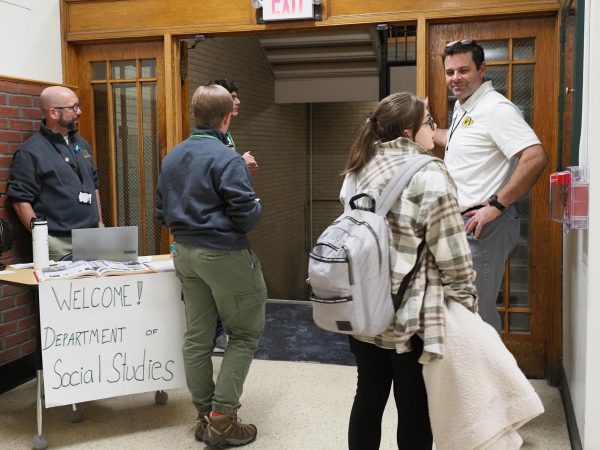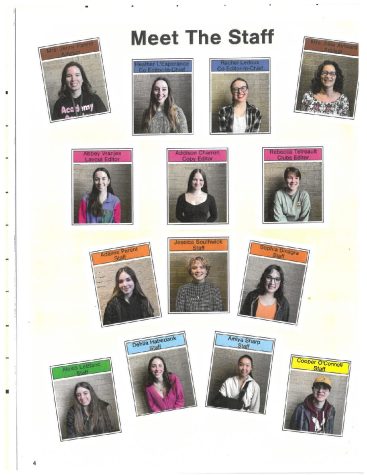The Christmas Pickle

The Christmas pickle. Photo credit: Jessica Southwick
December 24, 2022
As the holiday season comes around, there is an enjoyable clash of cultures and traditions to bring people together. This sharing of traditions can help people grow understanding and acceptance of each other. One specific holiday tradition that comes to mind is the hiding of the pickle ornament.
The Christmas pickle is a glass, deep green, ornament that blends well with the color of evergreen. There are a variety of sizes and styles including tiny pickles for mini trees. When you purchase a Christmas pickle ornament, it comes with a variation of a little poem:
To start a tradition that will surely last,
Here’s a short story about a pickle of glass.
The night before Christmas it’s hung on the tree,
while everyone’s sleeping it’s done secretly.
And on Christmas morning when you arise,
the first one who finds it will get a surprise.
A family tradition for all to share.
You’ll look for the pickle year after year.
Despite the variety, the tradition and its origin are unknown to many. There is one widespread, common misconception, and many other theories although the true origins remain undetermined. The common belief is that the tradition started in Germany and was passed down throughout the generations until it made its way over to the United States.
There is one glaring flaw with this theory though. According to a survey conducted by USA Today in Dec. 2019, 91% of Germans had never even heard of the pickle tradition, let alone celebrated it in their homes.
One theory of how the tradition got started features an American Civil War soldier. This story is about a soldier who was originally from Germany, but traveled to America and was fighting for the Union in the Civil War. He was taken prisoner, he was starving and he was on the edge of death. He pleaded with the guard to get him just one last pickle before he died. The guard took pity on him and obliged. This sustained the soldier and gave him enough strength to live on. Eventually, when he was freed, he got back home and from then on he always hung a pickle on his Christmas tree to remember that a pickle saved his life. There is no record of this soldier, so it is unlikely that this story is true or the origin of the tradition.
The final story is probably the most likely as it appeals to consumerism in America. Germany does make glass ornaments of fruits and vegetables and these ornaments became quite popular in America in the 1880s. As the story goes, the other fruits and vegetables were flying off of the shelves but the pickles remained and no one was buying them A crafty salesman who wanted to make sales and a profit on the imported pickle ornaments came up with the story to sell the pickles and told people that it was an old German tradition. This was believable as the ornaments came from Germany.
The Mercury conducted a survey with Bellows Free Academy students about their knowledge of, and experience with, the Christmas pickle. The BFA students polled had a lot to say about the tradition. Of the 45 students who answered the survey, just over half had heard of the tradition at 51.1%. However, only 35.6% of the students polled celebrate this tradition in one way or another. The students who celebrate it all said that they enjoyed the tradition. Many families have fun ways to celebrate the tradition.
Emma Archambault’s (‘23) family has a very structured way of celebrating sharing that the tradition, as she said it “only occurs on Christmas Eve.” She explained how an adult member of her family starts it by, “hid[ing] the pickle and [then] all of the grandchildren try to find it. Whoever finds it first wins a present.” They then play more rounds, “without a present.”
Laurelle Boomhower’s (‘24) family has an intricate game to celebrate. “We all get together and someone hides the pick[le] in the tree along wit[h] a few other orn[a]ments. The pick[le] is always the hardest to find. The orn[a]ments are all worth a certain amount of points while the pick[le] is worth the most. Whoever get[s] the most points essentially wins the game and gets to open a present early,” Boomhower said.
The rewards also vary, with Lily Duffy (‘25) explaining how at her home, “Whoever wins gets whatever type of cookies they want.” Duffy said that their mom makes the winner’s choice of cookie to eat later in the day.
Wyatt Root (‘24) said that in addition to opening the first present, whoever finds the pickle first gets “a year of good luck.”
People’s reactions were mainly positive and one student thought of a fun way to bring it into school. Erikka Wright (‘26) said she “feel[s] like it would be fun to do it in a homeroom challenge or a class period greeting.” This would be a uniting homeroom challenge during spirit week.
This holiday season, consider starting the pickle tradition in your family as a fun new way to celebrate.










